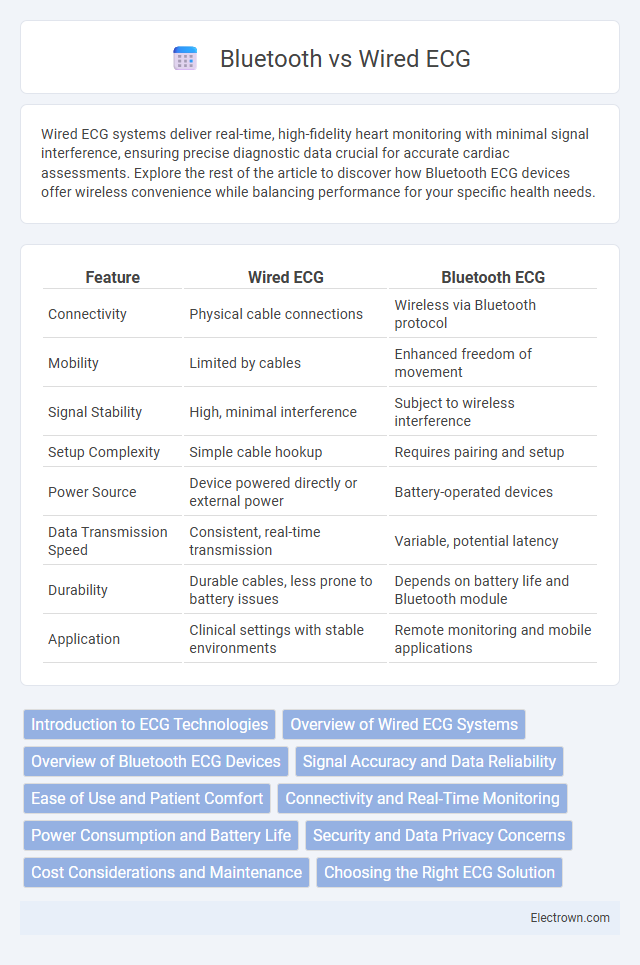Wired ECG systems deliver real-time, high-fidelity heart monitoring with minimal signal interference, ensuring precise diagnostic data crucial for accurate cardiac assessments. Explore the rest of the article to discover how Bluetooth ECG devices offer wireless convenience while balancing performance for your specific health needs.
Table of Comparison
| Feature | Wired ECG | Bluetooth ECG |
|---|---|---|
| Connectivity | Physical cable connections | Wireless via Bluetooth protocol |
| Mobility | Limited by cables | Enhanced freedom of movement |
| Signal Stability | High, minimal interference | Subject to wireless interference |
| Setup Complexity | Simple cable hookup | Requires pairing and setup |
| Power Source | Device powered directly or external power | Battery-operated devices |
| Data Transmission Speed | Consistent, real-time transmission | Variable, potential latency |
| Durability | Durable cables, less prone to battery issues | Depends on battery life and Bluetooth module |
| Application | Clinical settings with stable environments | Remote monitoring and mobile applications |
Introduction to ECG Technologies
Wired ECG systems provide real-time, stable heart signal monitoring through electrodes directly connected to the device, ensuring high accuracy and minimal signal interference. Bluetooth ECG devices offer wireless convenience and mobility, transmitting cardiac data via Bluetooth protocols to smartphones or tablets, ideal for remote health tracking. You can select the technology best suited for your needs based on precision requirements and portability preferences.
Overview of Wired ECG Systems
Wired ECG systems use electrodes connected directly to the recording device via cables, providing high-fidelity and reliable cardiac signal acquisition essential for accurate diagnosis. These systems minimize signal interference and maintain stable contact during extended monitoring, making them ideal for clinical environments requiring precise data. Your healthcare provider often prefers wired ECGs for comprehensive arrhythmia detection and detailed waveform analysis.
Overview of Bluetooth ECG Devices
Bluetooth ECG devices offer wireless heart monitoring by transmitting real-time electrocardiogram data to smartphones or tablets, enhancing mobility and convenience during health assessments. These devices use low-energy Bluetooth technology to ensure prolonged battery life while maintaining accurate signal quality for continuous cardiac monitoring. Integration with mobile health apps enables users and healthcare professionals to track, store, and analyze ECG data remotely, facilitating timely diagnosis and management of cardiovascular conditions.
Signal Accuracy and Data Reliability
Wired ECG systems provide superior signal accuracy due to direct electrode contact, minimizing interference and ensuring precise cardiac data capture. Bluetooth ECG devices offer convenience and mobility but may experience signal degradation or data loss from wireless transmission, affecting reliability. Your choice depends on whether consistent data fidelity or flexibility in monitoring is more critical for your cardiac assessment needs.
Ease of Use and Patient Comfort
Bluetooth ECG devices offer greater ease of use by eliminating cumbersome wires, allowing patients more freedom of movement and reducing setup time in clinical settings. Wired ECG systems, while reliable, can cause discomfort due to restricted mobility and entanglement of leads, which may affect patient compliance during prolonged monitoring. Your choice between these technologies should consider the balance between convenience and the specific clinical requirements for accurate cardiac data collection.
Connectivity and Real-Time Monitoring
Wired ECG systems offer stable connectivity with minimal signal interference, ensuring precise real-time monitoring crucial for critical cardiac assessments. Bluetooth ECG provides wireless freedom, enabling continuous data transmission and remote patient monitoring, though it may occasionally face connectivity disruptions due to signal range or environmental factors. Real-time data accuracy in Bluetooth ECG depends on robust Bluetooth protocol versions and device compatibility to maintain seamless cardiac health tracking.
Power Consumption and Battery Life
Bluetooth ECG devices generally consume less power than wired ECG systems due to their efficient wireless transmission protocols and optimized low-energy components, extending your device's battery life significantly. Wired ECG systems rely on continuous power sources or frequent recharging, limiting portability and increasing energy consumption during use. Choosing Bluetooth ECG technology enhances usability by minimizing power consumption and maximizing operational time between charges.
Security and Data Privacy Concerns
Wired ECG devices offer enhanced security by maintaining a closed physical connection, reducing the risk of unauthorized data interception compared to Bluetooth ECG systems, which transmit data wirelessly and are more vulnerable to hacking or eavesdropping. Bluetooth ECG devices require robust encryption protocols and regular firmware updates to protect sensitive health information from cyber threats and ensure compliance with data privacy regulations like HIPAA. Your choice between wired and Bluetooth ECG should consider the balance between convenience and the critical need for safeguarding patient data during transmission.
Cost Considerations and Maintenance
Wired ECG systems generally have lower upfront costs but incur higher maintenance expenses due to cable wear and connector replacements, impacting long-term affordability. Bluetooth ECG devices, while more expensive initially, offer reduced maintenance needs by eliminating physical cables, lowering repair frequency and labor costs. Evaluating total cost of ownership must consider initial investment, durability, and ongoing service requirements for optimal budget planning in clinical environments.
Choosing the Right ECG Solution
Wired ECG devices offer stable, interference-free signal transmission essential for clinical diagnostics, while Bluetooth ECG monitors provide wireless convenience and mobility suitable for continuous or remote monitoring. Selecting the right ECG solution depends on factors like measurement accuracy, patient lifestyle, device portability, and intended use case, where wired systems excel in controlled environments and Bluetooth devices enhance real-time health tracking. Prioritize device compatibility with existing healthcare software and the security of data transmission to ensure optimal performance and patient safety.
Wired vs Bluetooth ECG Infographic

 electrown.com
electrown.com